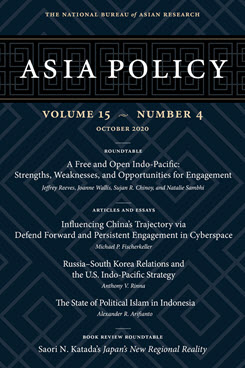Opportunity Seldom Knocks Twice
Influencing China’s Trajectory via Defend Forward and Persistent Engagement in Cyberspace
This article challenges the conventional wisdom regarding the strategic motivation and significance of China’s cyber-enabled theft of U.S. intellectual property (IP) and suggests that the U.S. has a unique opportunity via its cyber strategy to influence the trajectory of China’s rise.
EXECUTIVE SUMMARY
MAIN ARGUMENT
Common refrains regarding the strategic significance of China’s theft of U.S. IP include concerns of immediate economic losses, with estimates ranging from $250 billion to $600 billion annually, and the potential longer-term threat of disincentivizing innovation investments. But a focus on these consequences obscures the true strategic intent of China’s cyber-enabled IP-theft campaign. Around 2010, the Chinese Communist Party (CCP) leadership perceived that China was approaching a history-informed time limit to transition from a middle- to high-income economy, and that slowing growth or economic stagnation and sociopolitical upheaval could put at risk both the CCP’s legitimacy and China’s great-power status. In response, the CCP adopted a multifaceted technology transfer policy to counter the expected slowing growth by stimulating indigenous innovation. Only one facet of that policy—a centrally directed, significant cyber-enabled campaign of IP theft—was able to produce results in time, with certainty, and at a scale necessary to ensure China avoided economic stagnation. In 2018 the CCP again ramped up cyber-enabled IP theft to help mitigate pressure by jump-starting additional innovation-based growth. U.S. Cyber Command is a mature combatant command, and the U.S. Department of Defense is implementing a cyber strategy of “defend forward” and “persistent engagement” that intends to inhibit such illicit, cyber-enabled strategic gains by adversaries.
POLICY IMPLICATIONS
- The U.S. has a second opportunity to use cyber strategy to shape China’s rise while the Chinese economy is vulnerable. U.S. Cyber Command is now better aligned to the challenge of countering Chinese IP theft and has an improved capability to execute U.S. strategy.
-
China may still avoid long-term stagnation, but Xi Jinping’s predilection for cyber-enabled IP theft for mitigating economic pressure currently gives the U.S. a strategic advantage.
-
By denying China’s cyber-enabled IP theft, the U.S. could slow China’s rise or, given its current state, potentially influence the country to backslide into enduring stagnation.
Michael P. Fischerkeller is a research staff member in the Information, Technology and Systems Division at the Institute for Defense Analyses (United States). Since 2017, he has published over a dozen peer-reviewed articles developing the theory behind the U.S. cyber strategic approach of persistent engagement.
About Asia Policy
Asia Policy is a peer-reviewed scholarly journal presenting policy-relevant academic research on the Asia-Pacific that draws clear and concise conclusions useful to today’s policymakers. Asia Policy is published quarterly in January, April, July, and October and accepts submissions on a rolling basis. Learn more


